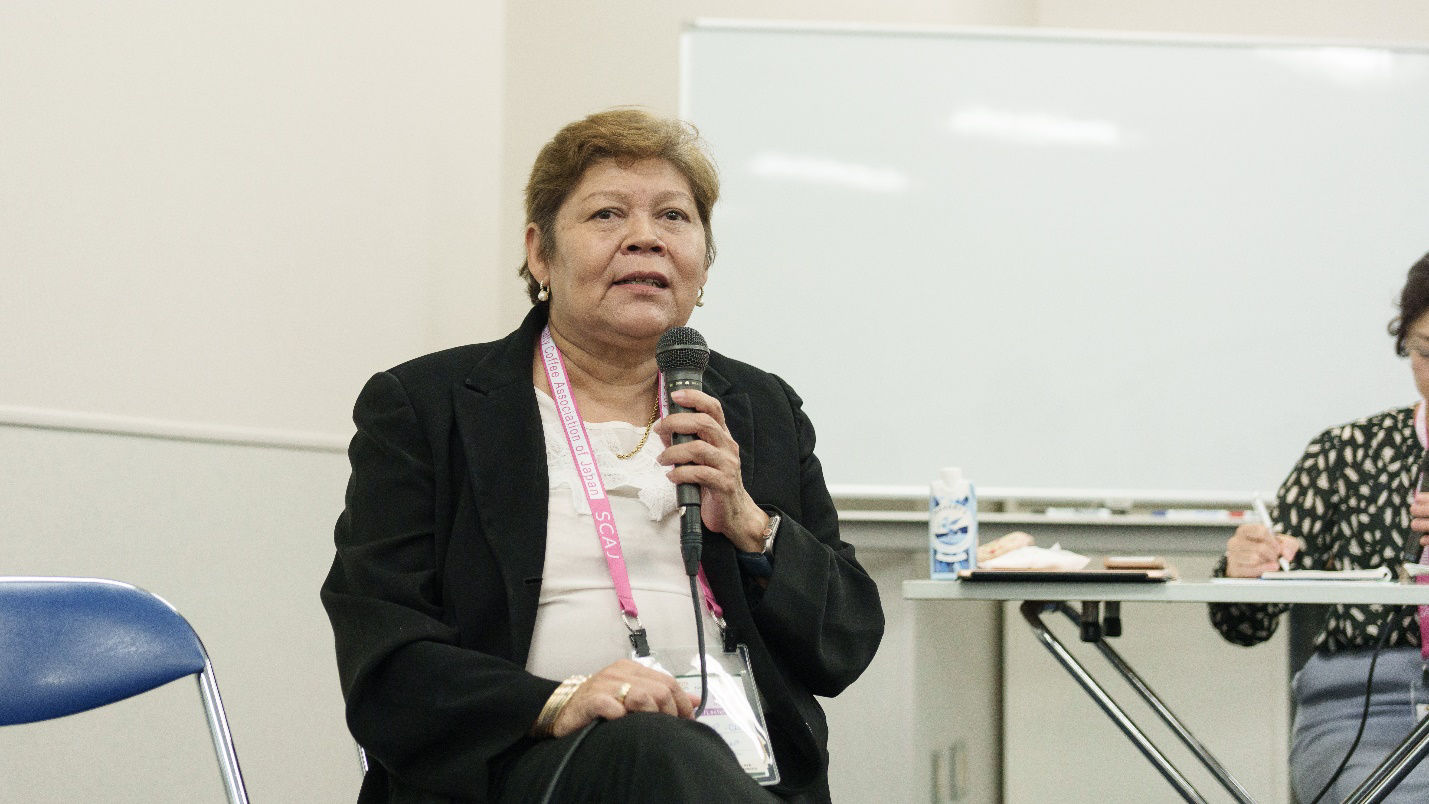▶Followed by English translation
2024年10月、アジア最大のスペシャルティコーヒーイベントSCAJ2024でセミナー講演をするためニカラグアから来日したメルリン・プレザ・ラモスさん(フェアトレード認証コーヒー生産者組合PRODECOOP協同組合のゼネラルマネージャー)に、長年にわたるフェアトレードの活動について、お話を伺いました。
インタビュアー
フェアトレード・ラベル・ジャパン
学生インターン ゼルファ・セラム・ビルハネ
立命館アジア太平洋大学 3年生(取材当時)
フェアトレードで活躍する女性:メルリンのフェアトレード運動から認証、そしてその先への道

「一杯のコーヒーの背景には家族がいます。コーヒーの持続可能性を望んでいるならば、フェアトレードコーヒーを選んでほしいです。」
Merlin Preza Ramos
38の小規模生産者組合と3,412世帯のコーヒー農家が所属するニカラグア北部の生産者組合連合 PRODECOOP (Central de Cooperativas de Servicios Múltiples Promotora de Desarrollo Cooperativo de las Segovias) でゼネラル・マネージャーを務めるメルリン・プレザ・ラモスは、30年以上もの間、フェアトレードの価値を伝え広めるために活動してきました。
メルリンの旅は、フェアトレードが草の根運動だった1990年代初頭に始まりました。世界市場が小規模農家を無視していることに気付き、変化をもたらそうと決意した彼女は、公正な価格と持続可能な慣行を重視しながら、ニカラグア産コーヒーの市場を見つけるために国際的なパートナーと協力しました。
フェアトレード運動の夜明け
メルリンがフェアトレードに関わり始めた1991年当時、フェアトレードは認証ではなく、まだ市民運動でした。世界市場へのアクセスをほとんど、または、まったく持っていなかったニカラグアのコーヒー生産者のために、彼女は仲間の献身的な専門家と共に、市場アクセス構築のために奔走したことを思い出します。米国やオランダを含む国際的なパートナーとの提携を通じて、メルリンは仲間と共に、小規模生産者がバイヤーと直接つながることができる市場への道を切り開き、コーヒー取引に公平性をもたらすことを目指す運動を育んでいきました。
「トレーニングや技術支援から始めたのですが、まだ組織化もされておらず、小規模生産者が販売できる市場もない中で仕事をしなければなりませんでした。」彼女は、小規模生産者が直面した苦難と、その障壁を克服するために彼らが考え出した創造的な解決策を強調しながら説明します。現地の農家と深いつながりを持つメルリンは、気候の問題や価格が変動する市場、特に景気後退期に生産者が直面する障壁を理解していました。
ニカラグア農家のための政策提言と世界の農家を代表した活動
メルリンの歩みはコーヒー生産に関するものだけではなく、彼女が支援する生産者の声を増幅させることでもありました。長年にわたり、彼女はこれらの農家を世界的に代表し、中南米フェアトレード生産者ネットワーク 団体 (CLAC)、フェアトレード・インターナショナル、FLOCERTといったグローバル組織の理事を務めてきました。また、有機認証機関や、パチャママ(https://pachamamacoffee.com/)、Cooperativas Sin Fronteras(国境なき協同組合)といった影響力のある組織の役員会にも、生産者の代表として参加してきました。「これらの役割のおかげで、重要な決定がなされるテーブルに生産者の声を届けることができました」とメルリンは語ります。彼女のリーダーシップにより、自分たちの生活に影響を与える政策の策定に、生産者自身の意見を反映させるために不可欠な仕組みが確立されました。
課題と成功: フェアトレード・プレミアムとコミュニティ開発
世界の企業とのフェアトレードの取引を通じて得られるフェアトレード・プレミアムは、多くのコーヒー栽培コミュニティにとって生命線となっています。メルリンは、これらの資金は診療所、教育プログラム、コーヒー加工施設など、コミュニティの重要なインフラのプロジェクトに直接投資されていると強調します。プレミアムを投資することで、PRODECOOPは強力な協同組合のインフラを構築することができ 、それによって彼らは独立してコーヒーを扱い、加工し、商品化することができます。
「このインフラ構築は、生産者たちがフェアトレード・プレミアムの一部を長期投資に割り当てることに同意しているからこそ可能なのです。」とメルリンは説明し、メンバーの団結精神とコミットメントを強調しました。PRODECOOPにとって、フェアトレードは透明性と信頼の枠組みも提供しました。経済的に困難な時期やコーヒーの価格が下落しているときでも、 PRODECOOPが生産者とオープンなコミュニケーションを維持できるようにしています。
(写真提供:PRODECOOP協同組合)
「私たちは生産者に対して透明性を保ち、私たちが支払うことのできる金額や、コストや課題の所在を正確に説明してきました」と彼女は言います。このオープンなアプローチは、協同組合内の信頼を育み、組合員同士の絆を強め、困難な時期にもたくましく生き抜く助けとなっています。
(写真提供:PRODECOOP協同組合)
女性農家のエンパワーメント:PRODECOOPのジェンダー政策
メルリンは、コーヒー産業における女性のエンパワーメントに、特に熱心に取り組んでいます。この使命は、彼女の個人的な経験に根ざしており、PRODECOOPのポリシーにも反映されています。ニカラグアの男性はニカラグア革命に関わっていたこともあり、農場管理の役割を担っていたのは多くの女性でした。この強みを認識したメルリンは、男女平等と包摂を推進するポリシーを確立することで、PRODECOOPにおける女性の役割を正式なものにすべく、尽力しました。
(写真提供:PRODECOOP協同組合)
PRODECOOPは2005年に、政治的エンパワーメント、経済的エンパワーメント、社会的エンパワーメントという3つの柱に基づく包括的なジェンダー政策を打ち立てました。政治的エンパワーメントの側面での進歩は緩やかでしたが、PRODECOOPが規約を改正し、意思決定機関における男女平等を確保するため、委員の50%を女性にすることを義務付けたことで、最近大きな前進が遂げられました。
(写真提供:PRODECOOP協同組合)
「これは、男女平等が単なる目標ではなく、基礎となる価値であることを私たちの規約に組み込んだ勝利でした」とメルリンは強調しました。さらに、PRODECOOPの各拠点協同組合には、組織のあらゆる分野で女性の参加を促進するためのジェンダー委員会があります。
経済的エンパワーメントの面では、PRODECOOPは女性たちが金融リソースへアクセスできるよう支援するために「Earth Fund」を創設しました。この資金により、女性たちはPRODECOOPのマイクロロット・ハイスペシャルティコーヒー・イニシアチブの元で、独自のスペシャルティコーヒーを栽培できるようになりました。このイニシアチブでは、女性農家が生産するコーヒーの品質と独自の特徴を強化しています。これにより女性農家の貢献を強化するだけでなく、スペシャルティコーヒー市場でよりよい価格を要求できるようにもなります。さらに、PRODECOOPは女性が追加の収入源を開発できるように起業家基金を提供することで、女性の経済的自立を高めています。
PRODECOOPのジェンダー ポリシーの社会的エンパワーメントの側面には、がん予防イニシアチブなどの健康プログラムが含まれます。当初は子宮がんに焦点を当てていましたが、その後、コーヒー栽培コミュニティのより広範な健康ニーズに対応するように拡大し、女性の健康に不可欠なサポートを提供しています。
逆境を乗り越える: 気候課題とレジリエンス
メルリンが直面する最も差し迫った課題のひとつは気候変動で、中米全域のコーヒー生産に深刻な影響を与えています。PRODECOOPの農家は、ハリケーン、植物病、その他の気候関連の逆境に耐えてきました。こうした自然の試練は、経済的困難と相まって、PRODECOOPの組合員のレジリエンスを試してきました。しかしメルリンは、 生産者間の連帯とフェアトレードの仕組みが、こうした試練に適応するのに役立っていると話します。フェアトレード・プレミアムはインフラと持続可能なプロジェクトに投資され、PRODECOOPがこうしたショックに耐え、繁栄し続ける能力を強化します。
(写真提供:PRODECOOP協同組合)
さらに、協同組合は、世界的なサプライチェーンとコーヒー市場を混乱させた新型コロナウイルス(COVID-19)パンデミックなど、予期せぬ課題に直面しました。それぞれの課題において、メルリンは団結と機知に富んだ対応に重点を置いて主導してきました。たとえば、協同組合が独自の加工施設を建設したことで、独立性を維持し、コストがかかり信頼性が低いことが多い、外部の加工サービスへの依存を回避することができました。
(写真提供:PRODECOOP協同組合)
持続可能なコーヒーのビジョン: メルリンから世界へのメッセージ
メルリンの消費者へのメッセージは明確で、心に響きます。「持続可能性に投資したければ、フェアトレードコーヒーを選ぶべきです。」メルリンにとって、一杯のコーヒーは単なる製品ではなく、生産者家族の勤勉さ、夢、回復力を表しています。フェアトレードを支援することは、消費者がより公平な世界に貢献し、小規模農家に力を与える強力な方法だと、彼女は信じています。
彼女のリーダーシップにより、PRODECOOPは単なるコーヒー協同組合を超え、コミュニティの強さ、男女平等、持続可能な開発のシンボルへと変貌を遂げました。フェアトレードが進化し続けるなか、メルリンはコーヒー農家に正義と尊厳をもたらすという使命に全力を注ぎ、フェアトレードの力が認証だけでなく、それがもたらす生活の向上にあることを世界に示しています。
(写真提供:PRODECOOP協同組合)
Fairtrade Woman: Merlin Preza Ramos’s Journey from Movement to Certification
“Behind every cup of coffee, there is a family. If you want to support sustainability, you should buy Fairtrade coffee.” Merlin Preza Ramos
As the General Manager of PRODECOOP, a cooperative representing 38 associations and 3,412 coffee producers in Nicaragua’s northern regions, Merlin Preza Ramos has spent over three decades championing Fairtrade’s values. Her journey began in the early 1990s when Fairtrade was a grassroots movement. From the outset, Merlin saw how global markets overlooked small-scale farmers. Determined to bring change, she collaborated with international partners to find markets for Nicaraguan coffee, emphasizing fair prices and sustainable practices.
Building a Movement: The Early Days with Fairtrade
Merlin’s involvement in Fairtrade began in 1991, during a time when Fairtrade was purely a movement rather than a certification. She recalls those initial efforts, when she and other committed professionals worked to build market access for Nicaraguan coffee producers who had little to no platform in global markets. Through alliances with international partners, including contacts in the United States and the Netherlands, Merlin and her colleagues forged pathways to market that allowed small producers to connect with buyers directly, fostering a movement that sought to bring fairness into coffee trading.
“We started with training and technical assistance, but we had to work without any formal structure or market for the small producers,” she explains, highlighting the struggle they faced and the creative solutions they developed to overcome barriers. Merlin, deeply connected with farmers on the ground, understood the obstacles they faced in navigating climate challenges and fluctuating markets, especially during economic downturns.
Advocacy and Global Representation for Nicaraguan Farmers
Merlin’s journey has not only been about coffee; it has been about amplifying the voices of the coffee producers she serves. Over the years, she has represented these farmers globally, serving on several prestigious boards, including the Latin American and Caribbean Network of Small Fairtrade Producers (CLAC), Fairtrade International, and FLOCERT. She has even represented producers on the boards of organic certification bodies and other influential organizations like Pachamama and Cooperativas Sin Fronteras. “These roles have allowed me to bring the voices of producers to the table, where important decisions are made,” Merlin shares. Her leadership within these organizations has helped establish a model where producers are integral to shaping policies that impact their lives.
Challenges and Triumphs: Fairtrade Premiums and Community Development
The Fairtrade premiums earned through PRODECOOP’s partnerships have been a lifeline for many coffee-growing communities. Merlin notes that these funds are directly reinvested into critical community infrastructure projects, including health clinics, educational programs, and coffee processing facilities. By reinvesting the premiums, PRODECOOP has been able to build a strong cooperative infrastructure that allows them to handle, process, and commercialize coffee independently. “This infrastructure is only possible because producers agreed to allocate part of their Fairtrade premium to these long-term investments,” Merlin explains, underscoring the collective spirit and commitment of the members.
For PRODECOOP, Fairtrade also provided a framework for transparency and trust. During times of economic hardship or when coffee prices have fallen, Merlin ensures that PRODECOOP maintains open communication with its producers. “We’ve been transparent with our producers, explaining exactly what we’re able to pay and where the costs and challenges lie,” she says. This open approach has fostered trust within the cooperative and strengthened bonds among its members, helping them stay resilient through difficult times.
Empowering Women Farmers: The Heart of PRODECOOP’s Gender Policy
Merlin is particularly passionate about empowering women within the coffee industry, a mission rooted in her personal journey and reflected in PRODECOOP’s policies. Nicaragua’s unique history shaped the role of women in agriculture, as many took on farm management roles while men were involved in the Nicaraguan revolution. Recognizing this strength, Merlin worked to formalize women’s roles within PRODECOOP by establishing policies that promote gender equality and inclusion.
By 2005, PRODECOOP had approved a comprehensive gender policy based on three pillars: political empowerment, economic empowerment, and social empowerment. The political empowerment aspect has been a gradual process, but significant strides were made recently when PRODECOOP amended its rules to ensure equal gender representation within decision-making bodies, mandating that 50% of committee members be women. “This was a victory, built into our statutes, where gender equality is not just a goal but a foundational value,” Merlin emphasizes. Additionally, each base cooperative within PRODECOOP has a gender commission dedicated to promoting women’s participation across all areas of the organization.
In terms of economic empowerment, PRODECOOP created an “Earth Fund” specifically to support women’s access to financial resources. With these funds, women have been able to cultivate their own specialty coffees under PRODECOOP’s Microlot High Specialty Coffee initiative, which emphasizes the quality and unique profiles of coffees produced by women farmers. This approach not only highlights their contributions but also enables them to command better prices in the specialty coffee market. Moreover, PRODECOOP offers entrepreneurial funds to help women develop additional income streams, thereby enhancing their economic independence.
The social empowerment aspect of PRODECOOP’s gender policy includes health programs, such as cancer prevention initiatives. Originally focused on uterine cancer, these programs have since expanded to address broader health needs in coffee-growing communities, providing vital support for women’s health.
Overcoming Adversity: Climate Challenges and Resilience
One of the most pressing challenges Merlin faces is climate change, which has severely impacted coffee production across Central America. PRODECOOP’s farmers have endured hurricanes, plant diseases, and other climate-related adversities. These natural challenges, combined with economic difficulties, have tested the resilience of PRODECOOP’s members. However, Merlin notes that solidarity among producers and the structure of Fairtrade have been instrumental in helping the cooperative adapt to these challenges. Fairtrade premiums, invested in infrastructure and sustainability projects, have strengthened PRODECOOP’s ability to withstand these shocks and continue to thrive.
Additionally, the cooperative has faced unexpected challenges, including the COVID-19 pandemic, which disrupted global supply chains and coffee markets. Through each of these challenges, Merlin has led with a focus on unity and resourcefulness. The cooperative’s decision to build its own processing facilities, for example, has allowed them to maintain independence and avoid relying on external processing services, which are often costly and less reliable.
A Vision for Sustainable Coffee: Merlin’s Message to the World
Merlin’s message to consumers is clear and heartfelt: “If you want to invest in sustainability, buy Fairtrade coffee.” For Merling, each cup of coffee represents not just a product, but the hard work, dreams, and resilience of a family. She believes that supporting Fairtrade is a powerful way for consumers to contribute to a more equitable world and empower small-scale farmers.
Through her leadership, Merlin has transformed PRODECOOP into more than just a coffee cooperative; it is now a symbol of community strength, gender equality, and sustainable development. As Fairtrade continues to evolve, Merlin remains committed to her mission of bringing justice and dignity to coffee farmers, showing the world that the power of Fairtrade lies not just in certification but in the lives it uplifts.


